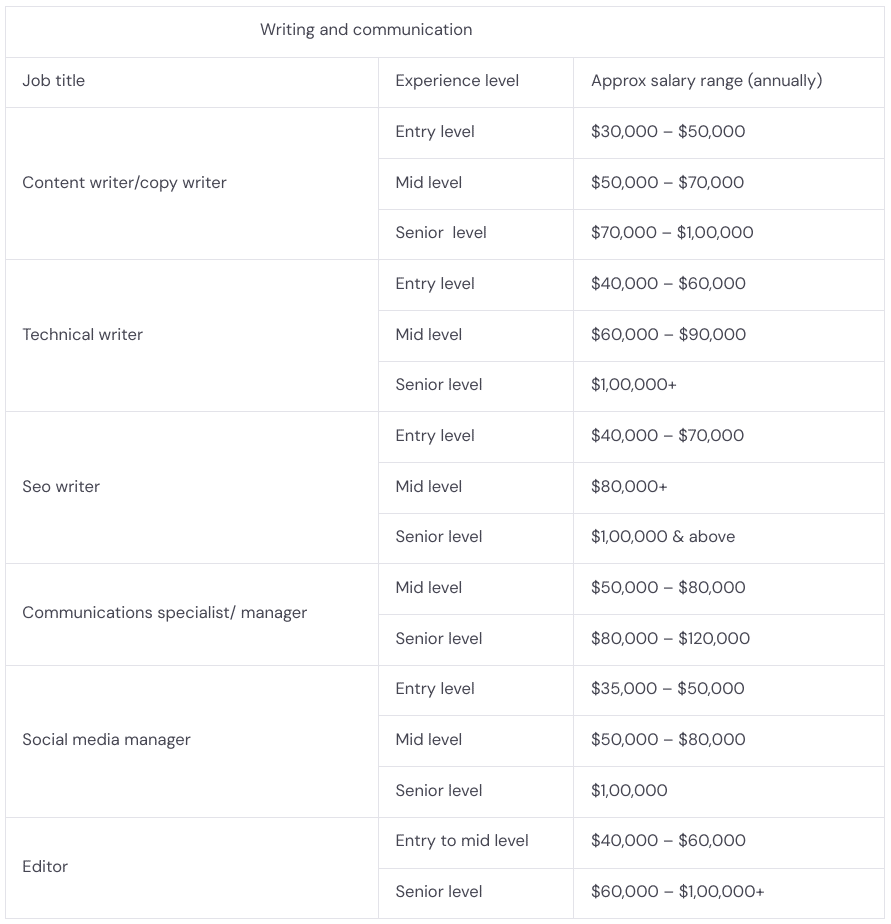Writing and Communication Talents – Hiring Tips and Suggestions

The marketing campaigns, the internal communications, the emails for business communication – all these activities required experienced and expert professionals from the writing and communication industry. Therefore, the profession is highly demanding to create a bridge between products and users.
This blog will show you how to hire remote professionals from the writing and communication industry, including skills, salary ranges, and other measures.
The sector is essential as a creative writer can project the company, promote products or services, and help connect to the clients to close business. In short, talented writers and communicators project the brand as it should.
Let’s understand the subdomains of writing and communication before going for further discussions.
Subdomain details of writing and communication
The writing and communication domain has various subdomains that add attributes for effective communication through words. Here is the list:
Technical writers
Technical Writers are professionals who specialize in communicating complex information, concisely, and accurately. They are responsible for creating technical documentation that helps users understand and use a product or service. The technical documentation can include user manuals, instruction guides, journal articles, project reports, and online help sections. Companies hire technical writers from various industries, including information technology, engineering, science, healthcare, and finance.
Medical writers
Medical Writers specialize in creating and reviewing scientific documents that communicate medical information clearly and accurately. They play a critical role in the healthcare industry by bridging the gap between complex medical knowledge and its understanding by various audiences, including healthcare professionals, regulatory bodies, and patients. Organizations hire medical writers to involve them in writing, editing, and reviewing multiple medical documents.
Copy editors
Copy editors refine written material to improve its readability, clarity, and correctness. They are crucial in publishing, ensuring that text is error-free, flows well, and adheres to the publisher’s style guide. Companies hire copy editors to ensure they play an indispensable role in the publishing process, enhancing the quality of written material by making it error-free, consistent, and accessible to its intended audience.
Required skills of writing and communication professionals – education & background
Writing and communication professionals need diverse skills to convey information and engage their audiences effectively. These skills are critical across various forms of media and communications, including journalism, content creation, public relations, and corporate communications.
Here’s a breakdown of the essential skills required:
Writing skills
- Strong grammar and syntax: Mastery of language rules, including grammar, syntax, and punctuation.
- Clear and concise writing: Ability to express ideas clearly and concisely, making content easy to understand.
- Adaptability in writing Style: Flexibility to adapt writing style to different formats, audiences, and purposes (e.g., journalistic writing, creative writing, technical writing).
- Research proficiency: Skills in conducting thorough research to gather accurate information and provide in-depth content.
- Attention to detail: Vigilance in spotting errors and ensuring precision in the written content.
- SEO knowledge: For digital content writers, an understanding of search engine optimization (SEO) is necessary to enhance the online visibility of web content.
Communication skills
- Effective verbal communication: Strong speaking abilities for presentations, interviews, and collaborative projects.
- Listening skills: Listening, understanding, and responding appropriately in various communication settings.
- Interpersonal skills: Building and maintaining professional relationships through effective communication.
- Cultural sensitivity: Understanding and respecting cultural differences in communication styles and content.
Content creation and strategy
- Content development: Developing engaging and relevant content aligned with organizational goals or audience interests.
- Strategic planning: Ability to plan and execute communication strategies for different platforms and audiences.
- Audience analysis: Understanding the target audience to tailor messages effectively.
Technical and digital proficiency
- Digital media savvy: Familiarity with digital and social media platforms, including content management systems and tools.
- Multimedia skills: Skills in using multimedia elements like images, videos, and infographics to enhance communication.
- Data interpretation: Ability to interpret and present data in a user-friendly manner.
Soft skills
- Creativity and innovation: Generating original ideas and creative approaches to content and communication.
- Problem-Solving: Addressing challenges creatively and effectively.
- Adaptability and flexibility: Adjusting to changing communication trends and media landscapes.
- Time Management: Balancing multiple projects and meeting deadlines.
- Collaboration: Working effectively with teams and stakeholders.
Educational and background requirements
- A degree in journalism, communications, English, or a related field is often required.
- Experience in writing, editing, or related communication roles.
- Continuous learning to stay updated with the latest trends and tools in communication and media.
Writing and communication professionals must blend technical skills in writing and content creation with soft skills like creativity and interpersonal communication to effectively engage and inform their audiences.
The country list to find the best talent in writing and communication
Finding the best talent in writing and communication can be a global endeavor, as skills in these areas are not confined to any specific region. However, certain countries are known for their strong emphasis on education in languages, communications, and the arts, which can lead to a higher concentration of skilled professionals in these fields.
Here’s a list of countries that are often recognized for their talent pool in writing and communication:
India
With one of the largest English-speaking populations in the world and a strong emphasis on education, India is a notable source of talented writers, many of whom are well-versed in both technical and creative writing.
Philippines
Known for its high English proficiency and a strong education system, the Philippines has a large pool of talented writers and communicators, often engaged in content creation and outsourcing industries.
United States
Known for its world-class universities and a diverse media landscape, the U.S. has a vast pool of talented writers and communicators, especially in English.
Canada
Canada’s high standard of education and multicultural environment make it a great source of talented writers and communicators, particularly in English and French.
Scandinavian Countries (Norway, Sweden, Denmark, Finland)
These countries have high English proficiency and strong education systems, producing skilled communicators and writers.
Bangladesh
Bangladesh has a growing pool of professionals in writing and communication. The trend is toward gradual improvement and increased global engagement, which bodes well for the future of professional writing and communication skills in Bangladesh.
The salary ranges in writing and communication for remote jobs
The salary ranges for remote jobs in writing and communication can vary widely based on several factors, including the specific role, the writer’s experience and skill level, the type of content or communication work, the employer’s location and budget, and the demand for the particular skill set.
Here’s a general overview of salary ranges for specific roles within this field:

Please note that these figures are approximate and can vary based on factors such as the cost of living in the employer’s location, the size and industry of the employer, contract length, and the individual’s negotiating skills can all influence salary.
The need for writing and communication professionals for your organization
The need for writing and communication professionals in an organization is vital for several reasons, irrespective of the industry or sector. These professionals play a crucial role in shaping the organization’s internal and external communication, branding, and overall projection of the company details.
Here are the essential points you must understand:
- Effective communication
- Marketing and public relations
- Internal operations
- Customer engagement
- Enhancing credibility and trust
- Diversity and inclusion
- Strategic role
Writing and communication professionals are integral to an organization’s success. Their skills are indispensable in today’s information-driven and highly connected business environment. The best part is the entire team can work remotely and produce 100% results like the office counterpart. How? Let’s check.
How remote hiring of writing and communication professionals minimize cost and maximize productivity
Remote hiring writing and communication professionals can lead to significant cost savings and productivity gains for organizations.
Here’s how this approach can be beneficial:
Cost minimization
Reduced overhead expenses: Hiring remotely eliminates the need for additional office space, utilities, equipment, and supplies that an in-house employee would require.
Wider talent pool at lower costs: Remote hiring allows access to a global talent pool. Employers can hire professionals from regions with lower living costs and competitive salary expectations than local hires.
Decreased recruitment costs: Online recruitment processes can be more cost-effective than traditional methods.
Flexible staffing: Remote hiring allows for more flexible staffing solutions, such as contract or part-time positions, which can be more cost-effective than full-time hires.
Lower turnover costs: If remote workers achieve a better work-life balance, this can lead to higher job satisfaction and lower turnover.
Productivity maximization
Increased worker productivity: Many remote workers report higher productivity due to fewer office distractions, a personalized work environment, and reduced commuting time.
Access to specialized skills: Remote hiring allows access to a diverse range of writing and communication specialists, enabling companies to find the exact skill set required for specific projects.
Employee well-being and satisfaction: Remote work often offers a better work-life balance, which can improve overall employee well-being and satisfaction.
Adaptability and scalability: Remote teams can be more easily scaled up or down based on the organization’s needs. This flexibility allows companies to respond quickly to changing demands.
Technology and collaboration tools: Remote work encourages the adoption of advanced collaboration tools and technology, fostering efficient communication and project management.
Focused hiring for specific tasks: Remote hiring allows companies to recruit professionals for specific tasks or projects.
How do you minimize remote hiring costs?
Minimizing costs associated with remote hiring requires a strategic approach that balances the recruitment process’s efficiency with the candidates’ quality.
Here are some effective strategies to reduce remote hiring costs:
Leverage digital recruitment tools: Utilize online job boards, social media platforms, and professional networks like LinkedIn to post job openings. These platforms often have lower costs compared to traditional recruitment methods.
Streamline the recruitment process: Use Applicant Tracking Systems (ATS) to automate parts of the recruitment process. This can help in efficiently sorting and managing applications.
Sign up with Global Squirrels: Global Squirrels is a one-stop solution for employers to simplify the hiring process seamlessly. There are many more to offer for employers to make the hiring journey an effective one.
Let’s know more about Global Squirrels.
How does Global Squirrels ease the hiring process?
Global Squirrels is a Staffing platform that assists you in hiring professionals remotely. With the signup, you can access the global talent pool from various industries. Additionally, the platform also helps in payroll management.
The benefits you will get once you sign up with Global Squirrels include the following:
- You can access massive professional profiles.
- The signup is free.
- There are no bloated markups or agency fees, only license fees per hire.
- You will get payroll management benefits, including compensation and tax calculations, managing leaves and benefits sheets, local labor laws guidelines, etc.
- It can manage compliance’s based on international laws.
- Besides individual professionals, you can hire a contractor.
Based on your job requirements, you can choose from our staffing plans: Orange Plan Employee/Freelancer, Blue Plan Employee, and Purple Plan Employee/Freelancer.
In conclusion
In summary, writing and communication professionals are pivotal in shaping public perception, conveying information, and upholding the integrity of the content they produce. Additionally, remote hiring in the writing and communication fields can lead to significant cost reductions while simultaneously boosting productivity, thanks to access to a wider talent pool from Global Squirrels, reduced overhead costs, and the many benefits remote work offers employees.
